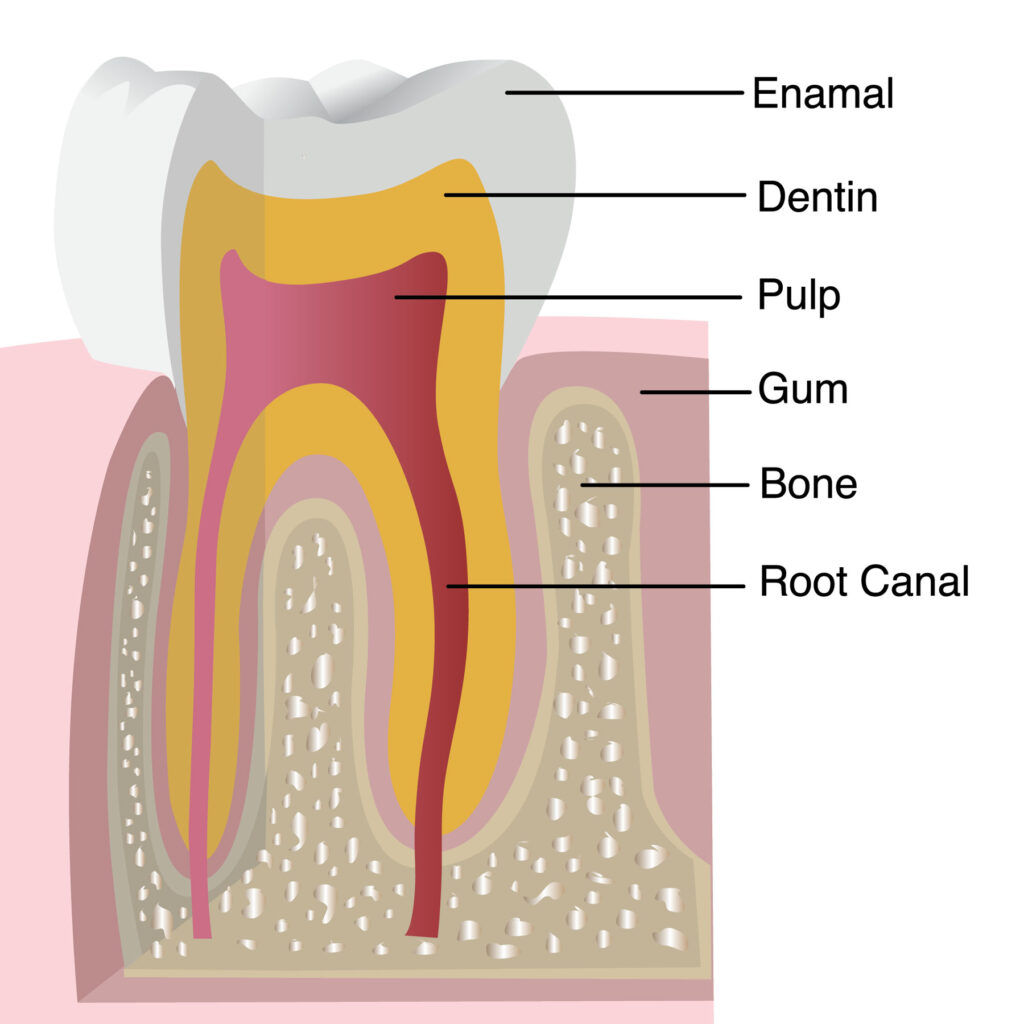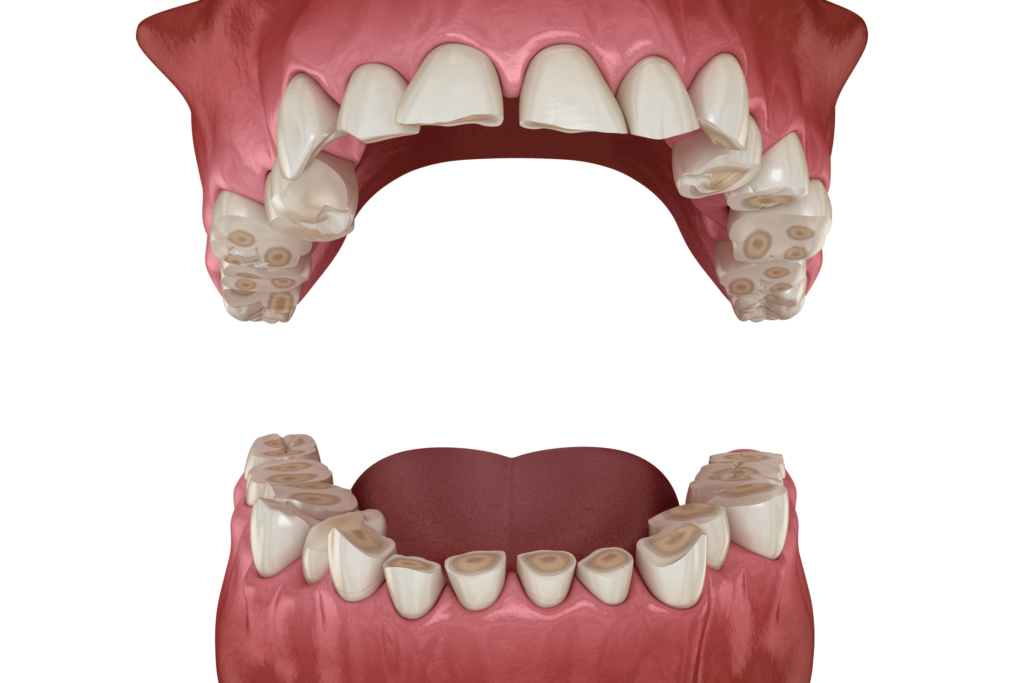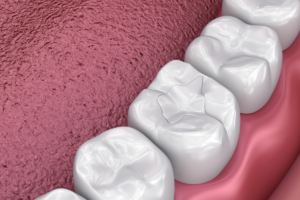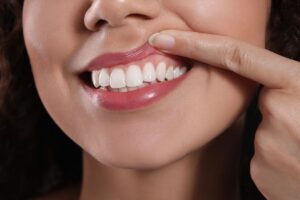What Is Enamel Erosion?
Enamel erosion, also called dental decay, can simply be defined as the loss of tooth enamel. Tooth enamel is the hard outer surface of your teeth with the primary purpose of protecting the tooth’s interior, referred to as the dentin layer. It is the hardest mineral in the human body, even harder than bone, and has an exceptionally tough layer about 2.5mm thick. However, the tooth enamel is still vulnerable and may get damaged and ultimately wear away by certain elements that can directly or indirectly cause extreme wear. Sugar and calcium, for instance, can affect the enamel and eventually cause the dentin layer to be exposed.

What Causes Enamel Erosion?
Calcium is essential for bone and teeth health, especially for enamel strength. Once calcium is drained from your teeth because of acid, your enamel will weaken. The mouth may become acidic as a result of poor diet or other health issues; this will in turn lead to calcium leaching and soft enamel. Soft enamel makes your tooth quite vulnerable to decay.
Your daily diet has a crucial role in chronic enamel erosion issues. Certain foods and beverages contribute to enamel erosion:
- Alcohol: Alcoholic foods and beverages cause dehydration and can also be loaded with sugar. Some special Alcoholic drinks, such as wine, can be pretty acidic, causing dry mouth.
- Carbonated drinks: Carbonated drinks are another culprit destroying tooth enamel. Sodas, for example, are loaded with sugar, and the carbonation causes them to also be high in Acid.
- Fruit Juice: Fruit juice is considered a healthy drink, but some fruit juices can be too acidic. Lemon, orange, apple, cranberry, and grapefruit juice are all high in acid and can weaken the enamel.
- Citrus Fruits: Fresh citrus fruits, especially oranges, lemons, and limes, can all wear down teeth, as well. Although not a citrus fruit, tomatoes are also very acidic.
- Sports Drinks: Sports drinks can cause enamel conditions due to their high sugar content. They also have acidic ingredients, including citric and phosphoric Acid, which are bad for Enamel health.
- Sour candy: The acidity in sour candies will weaken your enamel by helping the sugar to stick to it more quickly. Gummy candies are some of the most damaging types of candy you can consume.
Health problems, especially those involving the digestive system, can lead to tooth enamel erosion. Some health issues which are associated with tooth enamel erosion include:
- Diabetes: Diabetes is an inflammatory disorder that can affect the whole body, causing oral conditions such as enamel erosion, tooth decay, tooth loss, and gum disease.
- Eating disorders: Bulimia and anorexia can cause permanent damage to tooth enamel but in different ways. Bulimia can cause Enamel erosion as your teeth are exposed to stomach acid from vomiting. Anorexia can cause Enamel erosion due to the lack of minerals in the body, primarily calcium.
- TMD: Temporomandibular disorders or TMD are associated with issues involving the jaw joints and muscles. Tooth grinding, clenching, and abnormal chewing are some of the symptoms of TMD. This condition can cause excessive wear of the tooth enamel layer and even cracked teeth.
- Acid reflux: You may have issues with acid reflux. Chronic acid reflux can cause severe enamel erosion, mainly on the back of your teeth.

What Are Enamel Erosion Symptoms?
Enamel erosion can sometimes be seen as physical damage to the teeth, but it tends to be felt as a toothache or sensitivity to hot or cold foods or drinks.
The most common symptoms of enamel erosion include:
- Tooth pain and sensitivity;
- Discoloration in the form of yellowing;
- Transparency, especially around the edges of the front teeth;
- Small cracks or dents on the surface of the teeth;
- An odd rounded appearance to the teeth; and
- A roughed-up appearance on the tooth’s surface.
Enamel erosion and related tooth decay are pretty standard. If you experience slight discomfort or sensitivity, schedule an appointment with your dentist to address the issue as soon as possible.
How to Fix Enamel Erosion?
There are different treatments for enamel erosion depending on the causing factors. Once you schedule an appointment with your dentist for a tooth symptom, the dentist will examine that tooth and evaluate the extent of, and the reason for the damage and suggest the best method to treat the decay.
The most common treatment is fillings for minor enamel erosion, which has caused localized decay in tiny areas.
For significant enamel erosion, when the decay spots are too large for a filling, a crown will be placed. Veneers may also be utilized for more permanent protection of all your teeth.
Dental bonding can also be utilized to cover surfaces of multiple teeth.
Depending on the type of enamel erosion and the severity of the damage, you may need to have a root canal or even an extraction.

How to Prevent Future Enamel Erosion?
Preventing Enamel Erosion is incredibly important because it is a permanent condition. When enamel damage occurs, you can control it but cannot reverse it.
Some positive steps you could take to help prevent enamel erosion include:
- Brushing at least twice a day and flossing after big meals;
- Decreasing consumption of sugary, acidic, and carbonated foods and beverages;
- Drinking water after having acidic foods or eating citrus fruits. It helps rinse away the particles which cause the condition;
- Chewing xylitol gum frequently. This can stimulate saliva and clean the Acid remains off your teeth;
- Pairing acidic foods with other meals to reduce acidity levels in the mouth. For example, if you enjoy grapefruit at breakfast, consider having yogurt alongside that;
- Using a straw and swallowing immediately when drinking sugary and carbonated juices;
- Not brushing right away after acidic foods. Brushing on soft enamel can cause more harm than good;
- Not brushing right away after experiencing acid reflux. Rinsing your mouth thoroughly can help protect your teeth after vomiting.
If you’re noticing the symptoms of enamel erosion, do not forget that Enamel erosion is irreversible. The faster you take necessary treatment steps, the lesser will be the possibility of permanent enamel damage in the future.
The only thing you should do is contact us and enjoy the experience of treating your teeth in the good hands of our qualified staff.




















1 Comment
thank you for the article